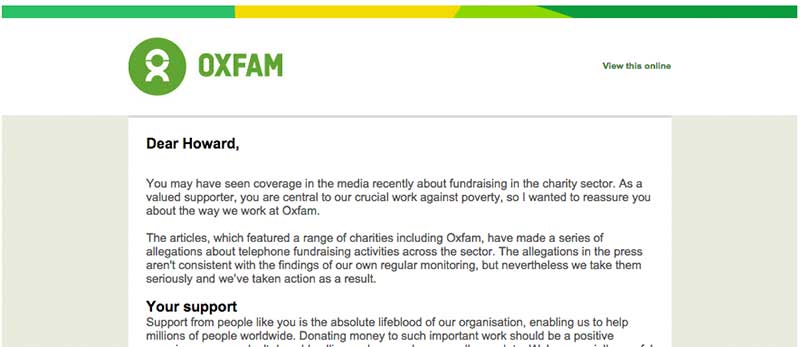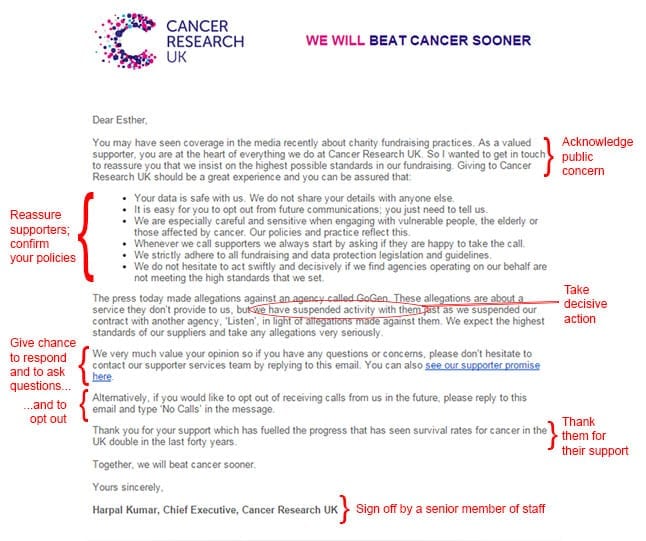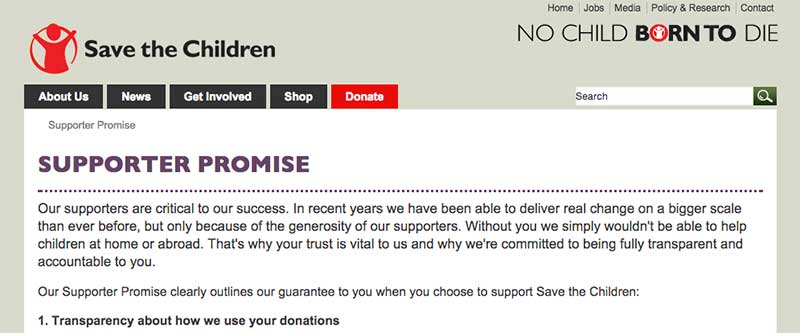Charities explain to donors how they fundraise, in response to Daily Mail criticisms
Following a series of criticisms this week in The Daily Mail levelled at charities and allegations about how some of them and their agencies fundraise, some of the larger charities have responding by explaining to their supporters how and why they fundraise.
Friends of the Earth’s interim Chief Executive had already written to donors on 22 June in the wake of coverage following the death of Olive Cooke to check that they were happy with the way the organisation communicated with them. He invited feedback, saying:
“On the back of this letter I’ve left lots of space for you to let me know if there’s anything we can do differently for you. I promise that if there’s anything we can do better to improve our communications, we’ll do it”.
1. Save the Children
Save the Children has this week announced its Supporter Promise, in which it presents new safeguards to ensure its supporters “have greater control over how they give to the charity and are not aggressively targeted”.
The Supporter Promise is a new pledge which will be fully implemented in the coming months and will guarantee:
• no cold telephone calling to members of the general public
• allow supporters easily and clearly to choose how they are contacted, meaning “we’ll never contact them if they ask us not to”;
• no details or data will ever be shared or sold; and,
• greater oversight – including training and regulation – of any call agency the charity uses.
The Promise was unveiled on the same day that Save the Children published its annual report for 2014. This showed that “it has achieved greater impact for children around the world than ever before – directly helping 17.4 million in 2014 and responding to 97 emergencies in 54 countries”.
The charity confirmed to donors that it was already collaborating with the Institute of Fundraising, the Fundraising Standards Board (FRSB) and other charities on a review of the self-regulatory framework.
Justin Forsyth, Save the Children CEO, said:
Advertisement
“Our passionate and dedicated supporters are the beating heart of our organisation and we recognise that the way we work with them has to improve. We have to get the right balance between raising much needed money, with making sure members of the public who want to help us save lives and give every child the chance to learn, feel respected and valued”.
The charity points out that it already publishes the salaries of its CEO and executive board members and publishes its own Accountancy and Transparency Report.
In announcing its Supporter Promise it also pointed out that in 2014 complaints about its fundraising activity, mailings and agencies were down 41 per cent from the previous year.
2. Oxfam
Oxfam’s Director of Fundraising Tim Hunter took a more robust approach in his email to supporters this week.
With the subject ‘How we raise valuable funds at Oxfam’, Hunter wrote that he “wanted to reassure you about the way we work at Oxfam” if you had “seen coverage in the media recently about fundraising in the charity sector”.
He said:
“The articles, which featured a range of charities including Oxfam, have made a series of allegations about telephone fundraising activities across the sector. The allegations in the press aren’t consistent with the findings of our own regular monitoring, but nevertheless we take them seriously and we’ve taken action as a result”.
Echoing some of the assurances offered by Save the Children, he confirmed that:
• “we don’t do cold calling and never share or sell your data”
• “We’re especially careful and sensitive when engaging with vulnerable people”
• “We are also very careful about data protection, making sure our valued supporters can choose their own preferences and control how they are contacted”.
• “We monitor calls, carry out undercover spot checks and make sure our strict guidelines are followed”.
He added that “I’ve personally tested these robust measures to ensure we are operating in the most ethical way”.

Oxfam’s Director of Fundraising Tim Hunter explains to supporters how it fundraises and what it offers to donors
It was crucial, he said, that “the companies working on our behalf meet not only the regulatory standards, but also our own high moral and ethical standards. So we act fast if they’re not following our practices”.
He confirmed that Oxfam was undertaking its own investigation into the press allegations and pressing for sector-wide action, “working with other charities to ensure we uphold high fundraising standards collectively”.
He also rebutted criticisms in the press coverage of charity expenditure on “non-charitable activities”, pointing out that “82p of every pound you give is spent on our vital emergency, development and campaigning work”.
Like Friends of the Earth, he invited supporters to share any concerns they might have, offering personally to look into any raised.
3. Cancer Research UK

CRUK’s CEO responds to donors. Image and commenting by Steven Yorke (http://nonprofitcomms.org/2015/07/16/how-charities-should-respond-to-negative-press/)
Cancer Research UK’s CEO Harpal Kumar wrote promptly to supporters with the aim of reassuring supporters and putting the record straight. For example, he wrote that “these allegations are about a service they [GoGen telephone fundraising agency] don’t provide to us”.
Nevertheless he confirms that the charity has suspended all its activity with the company, as it had already done so with another telephone agency Listen.
Kumar invited responses from donors, and reminded donors of what CRUK commits to in its supporter promise.




